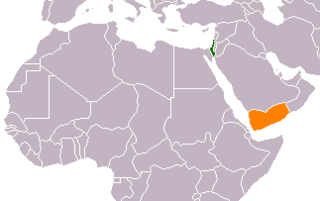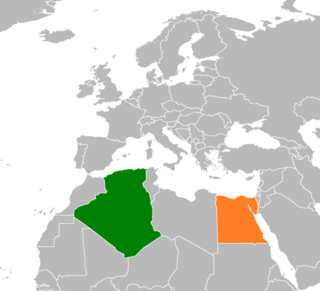
Since its independence from France in 1962, Algeria has pursued an activist foreign policy. In the 1960s and 1970s, Algeria was noted for its support of Third World policies and independence movements. Since its independence, Algeria has been a member of the Arab League, the African Union and of the United Nations.

The National Liberation Front commonly known by its French acronym FLN, is a nationalist political party in Algeria. It was the principal nationalist movement during the Algerian War and the sole legal and ruling political party of the Algerian state until other parties were legalised in 1989.

Houari Boumédiène was an Algerian military officer and politician who served as Chairman of the Revolutionary Council of Algeria from 19 June 1965 until 12 December 1976 and thereafter as the second president of Algeria until his death in 1978.

There are no diplomatic relations that exist between Israel and Yemen and relations between the two countries are very tense. Yemen refuses the admission of people with an Israeli passport or any passport with an Israeli stamp, and the country is defined as an "enemy state" by Israeli law. During the 2023 Israel–Hamas war war, the Iran backed Houthi movement in Yemen launched missile attacks against Israel and ships in the Red Sea.

Relations have existed between Bahrain and Israel since Bahrain achieved its independence in 1971. In recent years, relations between the two countries have been thawing, and the countries agreed to establish diplomatic relations in September 2020. The foreign minister of Bahrain Khalid bin Ahmed Al Khalifa has been quoted saying "Israel is part of the heritage of this whole region, historically. So, the Jewish people have a place amongst us." The common threat of Iran has provided common ground for a thaw in what were once tense relations. Bahrain's foreign policy traditionally supports the creation of an independent Palestinian state.

The State of Israel was formally established by the Israeli Declaration of Independence on 14 May 1948, and was admitted to the United Nations (UN) as a full member state on 11 May 1949. As of December 2020, it has received diplomatic recognition from 165 of the 193 total UN member states, and also maintains bilateral ties with all of the Permanent Five. 28 member states have either never recognized Israel or have withdrawn their recognition; others have severed diplomatic relations without explicitly withdrawing their recognition. Additionally, many non-recognizing countries have challenged Israel's existence—predominantly those in the Muslim world—due to significant animosity stemming from the Israeli–Palestinian conflict and the Arab–Israeli conflict.

Israel and Mauritania relations refers to the historic and current bilateral relationship between Israel and Mauritania. Mauritania declared war on Israel as part of the Six Day War In 1999, Mauritania became the third member of the Arab League—after Egypt and Jordan—to recognize Israel as a sovereign state. However, after Gaza War, Mauritania severed all relations by March 2010.

The alliance between Algeria and Palestine is strong and enduring. Algeria is a supporter of the Middle East peace process and it has no diplomatic relations with Israel.

Since the Israeli Declaration of Independence in 1948, a number of countries and individuals have challenged the country's political legitimacy. Under international law, Israel has always met the standards for recognition as a sovereign state. However, over the course of the Arab–Israeli conflict, the country's authority has been questioned on a number of fronts. Critics of Israel may be motivated by their opposition to the country's right to exist or, since the 1967 Arab–Israeli War, their disapproval of the established power structure within the Israeli-occupied territories. Some have called for Israel's destruction.

Relations between Egypt and Algeria have been generally friendly throughout their history which dates back to Egypt's strong support for Ahmed Ben Bella's FLN during the Algerian War of Independence. This was later followed by Algeria's support for Egypt during the Six-Day War in 1967 and the October War in 1973. In addition both countries are member states of the Arab League while sharing similar views on major regional issues such as the Palestinian cause and the conflict in Sudan as well as the same vision on reforming the United Nations Security Council.
Arab–Israeli relations refers to relations between Israel and Arab nations. Israel's relations with the Arab world are overshadowed by the Arab–Israeli conflict and the Israeli–Palestinian conflict. Israel has been at war with Arab states on several occasions. Furthermore, a large majority of states within the Arab League do not recognize Israel, and Israelis and Jews in general are considered a frequent target of antisemitism in the Arab world. After several Arab-Israeli wars, Egypt was the first Arab state to recognize Israel diplomatically in 1979 with the signing of the Israel-Egypt Peace Treaty. It was followed by Jordan with the Israel-Jordan Peace Treaty in 1994. In 2020, four more Arab states normalized relations. There have also been talks of an emerging Arab–Israeli alliance against Iran.
The Arab–Israeli alliance, sometimes called the Israeli–Sunni alliance, refers to an unofficial security coalition comprising Israel and various Arab countries. Originally formed in the interest of the Gulf Cooperation Council, it is primarily focused on deterring the political and military ambitions of Iran, and has been actively promoted by the United States since the February 2019 Warsaw conference.

Official relations between the two countries of Palestine and the Sahrawi Arab Democratic Republic do not exist, being as neither country is fully recognised internationally. Despite this, there are informal connections.

The Israel–United Arab Emirates normalization agreement, officially the Abraham Accords Peace Agreement: Treaty of Peace, Diplomatic Relations and Full Normalization Between the United Arab Emirates and the State of Israel, was initially agreed to in a joint statement by the United States, Israel and the United Arab Emirates on August 13, 2020, officially referred to as the Abraham Accords. The UAE thus became the third Arab country, after Egypt in 1979 and Jordan in 1994, to agree to formally normalize its relationship with Israel, as well as the first Persian Gulf country to do so. Concurrently, Israel agreed to suspend plans for annexing parts of the West Bank. The agreement normalized what had long been informal but robust foreign relations between the two countries. The agreement was signed at the White House on September 15, 2020. It was approved unanimously by the Israeli cabinet on October 12 and was ratified by the Knesset on October 15. The UAE parliament and cabinet ratified the agreement on October 19. The agreement went into effect on January 5, 2021.

The Bahrain–Israel normalization agreement, officially Abraham Accords: Declaration of Peace, Cooperation, and Constructive Diplomatic and Friendly Relations, is an agreement to normalize diplomatic and other relations between Bahrain and Israel. The agreement was announced by President Donald Trump on September 11, 2020, and followed on from a joint statement, officially referred to as the Abraham Accords, by the United States, Israel and the United Arab Emirates (UAE) on August 13, 2020. It was formally signed on September 15, 2020, at the White House in Washington, D.C., and made Bahrain the fourth Arab state to recognize Israel and the second within a month.
The Israel–Sudan normalization agreement is an agreement that took place on October 23, 2020, whereby Israel and Sudan agreed that they will normalize relations. It is not clear if the deal establishes full diplomatic relations between the two nations. According to Axios reporting on March 10, 2021, "While Israel has presented Sudan with a draft agreement for establishing diplomatic relations, the Sudanese want an endorsement from the Biden administration." The agreement came after the agreements of Bahrain and the United Arab Emirates signed with Israel in September 2020. Unlike the latter two, Sudan had sent troops to fight against Israel in major Arab-Israeli wars and considered Israel an enemy state.

Since the 1970s, there has been a parallel effort made to find terms upon which peace can be agreed to in the Arab–Israeli conflict and also specifically the Israeli–Palestinian conflict. Over the years, numerous Arab League countries have signed peace and normalization treaties with Israel, beginning with the Egypt–Israel peace treaty (1979). Despite the failure to implement the Israeli–Lebanese peace accords (1983), more treaties continued with the Israeli–Palestinian peace process (1991–present), the Israel–Jordan peace treaty (1994), the Abraham Accords normalizing relations between Israel–United Arab Emirates and Israel–Bahrain (2020), the Israel–Sudan normalization agreement (2020) and the Israel–Morocco normalization agreement (2020). Moreover, numerous Arab League members established semi-official relations with Israel.

The Israel–Morocco normalization agreement is an agreement announced by the United States government on December 10, 2020, in which Israel and Morocco agreed to begin normalizing relations. On December 22, 2020, a joint declaration was signed pledging to quickly begin direct flights, promote economic cooperation, reopen liaison offices and move toward "full diplomatic, peaceful and friendly relations." Morocco officially recognized Israel in its communication to Israeli Prime Minister Benjamin Netanyahu.

Israel–Libya relations describes the relations between Israel and Libya. While there have been no formal diplomatic agreements between Israel and Libya since Libya's independence, there have been some notable events and developments in their relationship over the years. One of the main reasons for Libya's antagonism towards Israel has been its support for the Palestinian cause. Libya, under the rule of Muammar Gaddafi, was a staunch supporter of the Palestinian cause and provided aid and support to various Palestinian militant groups.

Relationship between the Kingdom of Morocco and the State of Palestine has been historically deep, yet complicated. Morocco has a consulate in Gaza while Palestine has an embassy in Rabat.


















